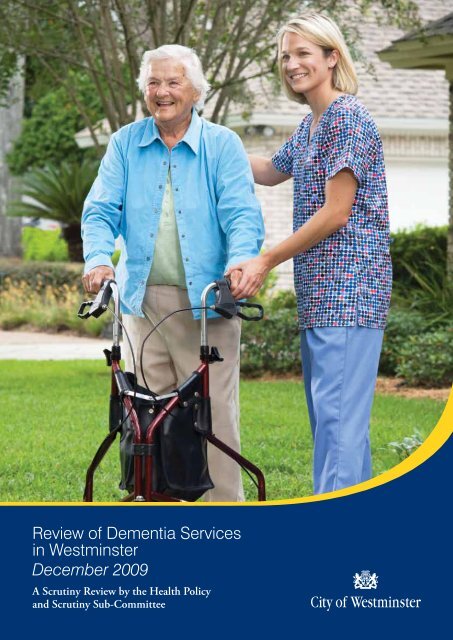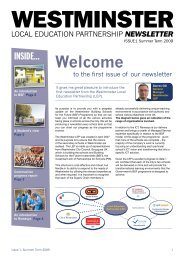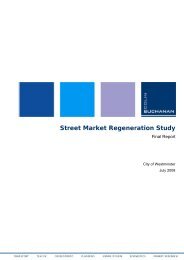Review of Dementia Services in Westminster December 2009
Review of Dementia Services in Westminster December 2009
Review of Dementia Services in Westminster December 2009
You also want an ePaper? Increase the reach of your titles
YUMPU automatically turns print PDFs into web optimized ePapers that Google loves.
<strong>Review</strong> <strong>of</strong> <strong>Dementia</strong> <strong>Services</strong><br />
<strong>in</strong> Westm<strong>in</strong>ster<br />
<strong>December</strong> <strong>2009</strong><br />
A Scrut<strong>in</strong>y <strong>Review</strong> by the Health Policy<br />
and Scrut<strong>in</strong>y Sub-Committee
2 <strong>Review</strong> <strong>of</strong> <strong>Dementia</strong> <strong>Services</strong> <strong>in</strong> Westm<strong>in</strong>ster by the Health Policy and Scrut<strong>in</strong>y Sub-Committee Westm<strong>in</strong>ster City Council <strong>Review</strong> <strong>of</strong> <strong>Dementia</strong> <strong>Services</strong> <strong>in</strong> Westm<strong>in</strong>ster by the Health Policy and Scrut<strong>in</strong>y Sub-Committee Westm<strong>in</strong>ster City Council 3<br />
Acknowledgements<br />
We are grateful for a number <strong>of</strong> helpful contributions to the review<br />
process. In particular we would like to thank those people liv<strong>in</strong>g with<br />
dementia and their family carers for the <strong>in</strong>sight they provided.<br />
Thanks must also be paid to the practitioners we spoke with, particularly:<br />
Jude Sweet<strong>in</strong>g, Development Officer, Westm<strong>in</strong>ster Primary Care Trust (PCT)<br />
John Higg<strong>in</strong>s, Commissioner for Older People & Physical disabilities, NHS Westm<strong>in</strong>ster<br />
Claudia Wald, Team Manager, Older People’s Community Mental Health Team (CMHT),<br />
Central and North West London NHS Foundation Trust (CNWL)<br />
Erzsebet Pek, Team Manager, Memory Service, CNWL<br />
Sandra Brookes, Head <strong>of</strong> Service for Older Adults, CNWL<br />
Scott Chandler, Service Manager, CNWL<br />
Sean Mooney, Team Manager, Young Onset <strong>Dementia</strong> Service, CNWL<br />
Lee Sims, <strong>Dementia</strong> Operations Manager, Hous<strong>in</strong>g 21 & <strong>Dementia</strong> Voice<br />
Diane Cole, Centre Manager, Tresham <strong>Dementia</strong> <strong>Services</strong><br />
Paul Kirwan, Chief Executive, Carers Network Westm<strong>in</strong>ster<br />
Westm<strong>in</strong>ster GIS Team<br />
Background<br />
+ As part <strong>of</strong> the <strong>2009</strong>/10 work plan, the Health Policy and Scrut<strong>in</strong>y Sub-Committee Scrut<strong>in</strong>y Task<br />
Group agreed to undertake a scrut<strong>in</strong>y review <strong>of</strong> the <strong>Dementia</strong> <strong>Services</strong> available with<strong>in</strong> Westm<strong>in</strong>ster.<br />
Contents<br />
Lead Member’s Introduction 4<br />
Executive Summary 5<br />
Recommendations 6<br />
Introduction: <strong>Dementia</strong> 8<br />
Westm<strong>in</strong>ster Context: Incidence and Direction <strong>of</strong> Travel 9<br />
What We Did 10<br />
Provision: Mapp<strong>in</strong>g <strong>of</strong> <strong>Services</strong> 11<br />
Experiences <strong>of</strong> <strong>Dementia</strong> 14<br />
Westm<strong>in</strong>ster <strong>Services</strong>: Knowledge and Awareness 16<br />
Westm<strong>in</strong>ster <strong>Services</strong>: Early Diagnosis 18<br />
Westm<strong>in</strong>ster <strong>Services</strong>: Good Service Provision 21<br />
Look<strong>in</strong>g to the Future 24<br />
Conclusion 26<br />
+ Cllr Frances Blois was elected Lead Member for the <strong>Dementia</strong> <strong>Services</strong> <strong>Review</strong>.<br />
+ This report summarises the ma<strong>in</strong> f<strong>in</strong>d<strong>in</strong>gs <strong>of</strong> the review. For more <strong>in</strong>formation on any aspect<br />
<strong>of</strong> the reivew please contact Simon Lewis at slewis2@westm<strong>in</strong>ster.gov.uk or 020 641 4298.<br />
Report prepared by Lawrence Devl<strong>in</strong>, Research Analyst, on behalf <strong>of</strong> the Health Policy<br />
and Scrut<strong>in</strong>y Sub-Committee, Westm<strong>in</strong>ster City Council. Recommendations <strong>in</strong> the<br />
report were approved by the Health Policy and Scrut<strong>in</strong>y Sub-Committee on 15<br />
<strong>December</strong> <strong>2009</strong>.
4 <strong>Review</strong> <strong>of</strong> <strong>Dementia</strong> <strong>Services</strong> <strong>in</strong> Westm<strong>in</strong>ster by the Health Policy and Scrut<strong>in</strong>y Sub-Committee Westm<strong>in</strong>ster City Council <strong>Review</strong> <strong>of</strong> <strong>Dementia</strong> <strong>Services</strong> <strong>in</strong> Westm<strong>in</strong>ster by the Health Policy and Scrut<strong>in</strong>y Sub-Committee Westm<strong>in</strong>ster City Council 5<br />
Lead Member’s Introduction<br />
I am delighted to <strong>in</strong>troduce this report. As members<br />
<strong>of</strong> the post war baby boom, we are probably better<br />
<strong>in</strong>formed than any generation <strong>of</strong> the consequences<br />
<strong>of</strong> old age, whilst the new 60s is now considered to<br />
be the old 40s.<br />
Scarcely a day goes by where there<br />
is not a press report or television<br />
programme about the problems<br />
encountered by those suffer<strong>in</strong>g<br />
from dementia either at home<br />
or <strong>in</strong> care homes. In many cases<br />
people and their families suffer<br />
<strong>in</strong> silence just blam<strong>in</strong>g advanc<strong>in</strong>g<br />
years until a serious crisis presents<br />
itself. Early diagnosis and a care<br />
plan with help from services such<br />
as the new Memory Service and<br />
appropriate day centres to enable<br />
carers, particularly if they are a<br />
close relative, to have a break<br />
are all essential. Appropriate care<br />
homes or respite care are also<br />
alternatives.<br />
This report, which covers the visits<br />
made and group sessions attended,<br />
is an attempt to address dementia<br />
issues <strong>in</strong> Westm<strong>in</strong>ster. I enjoyed<br />
meet<strong>in</strong>g the patients, carers and<br />
pr<strong>of</strong>essionals dur<strong>in</strong>g late summer<br />
and autumn <strong>2009</strong> and hope that<br />
the f<strong>in</strong>d<strong>in</strong>gs and recommendations<br />
<strong>in</strong> this report will help <strong>in</strong> the<br />
treatment and future well-be<strong>in</strong>g<br />
<strong>of</strong> those <strong>in</strong> all stages <strong>of</strong> dementia.<br />
My thanks goes to Jude Sweet<strong>in</strong>g<br />
for help<strong>in</strong>g to coord<strong>in</strong>ate all the<br />
various strands and my best<br />
wishes go to all who so will<strong>in</strong>gly<br />
contributed to this report which<br />
I hope will help to <strong>in</strong>crease our<br />
knowledge base.<br />
Councillor Frances Blois<br />
Lead Member on the <strong>Review</strong><br />
<strong>of</strong> <strong>Dementia</strong> <strong>Services</strong> <strong>in</strong><br />
Westm<strong>in</strong>ster<br />
Health Policy and Scrut<strong>in</strong>y<br />
Sub-Committee<br />
<strong>December</strong> <strong>2009</strong><br />
Executive Summary<br />
As part <strong>of</strong> <strong>in</strong>creas<strong>in</strong>g media attention and <strong>in</strong> response to the National<br />
<strong>Dementia</strong> Strategy (NDS) our Westm<strong>in</strong>ster Health Policy and Scrut<strong>in</strong>y<br />
Sub-Committe has undertaken a review <strong>of</strong> dementia services provision<br />
across the city. The review has looked at a cross section <strong>of</strong> service <strong>of</strong>fered<br />
by the council, the Central and North West London (CNWL) NHS<br />
Foundation, NHS Westm<strong>in</strong>ster and our partner organisations.<br />
With<strong>in</strong> Westm<strong>in</strong>ster dementia services are<br />
<strong>of</strong>fered by the council, NHS Westm<strong>in</strong>ster,<br />
the Central and North West London NHS<br />
Foundation, a number <strong>of</strong> third sector partners<br />
and agencies and other volunteer groups.<br />
A wide range <strong>of</strong> services are <strong>of</strong>fered by these<br />
agencies to those liv<strong>in</strong>g with dementia and<br />
their family carers. <strong>Services</strong> <strong>in</strong>clude respite and<br />
peer support services for family carers while<br />
those liv<strong>in</strong>g with dementia are <strong>of</strong>fered diagnosis,<br />
treatment and therapies, as well as on-go<strong>in</strong>g<br />
care support and day centres.<br />
The review outl<strong>in</strong>es that 70% <strong>of</strong> people<br />
liv<strong>in</strong>g with dementia <strong>in</strong> Westm<strong>in</strong>ster rema<strong>in</strong><br />
undiagnosed and this number is set to <strong>in</strong>crease<br />
from 1,648 to 2,567 by 2025. Whilst this<br />
rema<strong>in</strong>s 7% <strong>of</strong> the expected population, the<br />
comb<strong>in</strong>ation <strong>of</strong> a high percentage <strong>of</strong> older<br />
people liv<strong>in</strong>g alone and a number <strong>of</strong> hard to<br />
target groups means that the need for care<br />
packages will <strong>in</strong>crease greatly.<br />
The review has focused on the experiences<br />
<strong>of</strong> service users, both family carers and those<br />
liv<strong>in</strong>g with dementia, and <strong>in</strong> l<strong>in</strong>e with the NDS,<br />
the f<strong>in</strong>d<strong>in</strong>gs are organised around the three<br />
key objectives <strong>of</strong>:<br />
1 Knowledge and Awareness<br />
2 Early Diagnosis<br />
3 Good Service Provision<br />
Our review shows that dementia care <strong>in</strong><br />
Westm<strong>in</strong>ster is already at a high standard,<br />
however the research has also recognised<br />
some service gaps. Specifically it is noted<br />
that Westm<strong>in</strong>ster fits the national context <strong>of</strong><br />
provid<strong>in</strong>g services only at the po<strong>in</strong>t <strong>of</strong> crisis<br />
and the review makes a strong argument that<br />
early diagnosis and referrals are vital.<br />
Look<strong>in</strong>g to the future it is imperative that the<br />
new Westm<strong>in</strong>ster Memory Service succeeds.<br />
More widely, the potential for transform<strong>in</strong>g<br />
exist<strong>in</strong>g services and develop<strong>in</strong>g hub based<br />
dementia provision should be explored<br />
through bold and <strong>in</strong>novative approaches.
6 <strong>Review</strong> <strong>of</strong> <strong>Dementia</strong> <strong>Services</strong> <strong>in</strong> Westm<strong>in</strong>ster by the Health Policy and Scrut<strong>in</strong>y Sub-Committee Westm<strong>in</strong>ster City Council <strong>Review</strong> <strong>of</strong> <strong>Dementia</strong> <strong>Services</strong> <strong>in</strong> Westm<strong>in</strong>ster by the Health Policy and Scrut<strong>in</strong>y Sub-Committee Westm<strong>in</strong>ster City Council 7<br />
Recommendations<br />
Experiences <strong>of</strong> <strong>Dementia</strong><br />
+ We need to take all necessary steps<br />
to <strong>in</strong>volve people with dementia <strong>in</strong> their own<br />
lives. This must be done <strong>in</strong> the way that they<br />
want, no matter if at home or <strong>in</strong> residential care.<br />
+ Service users should be provided with<br />
help to complete forms and the paperwork<br />
related to benefit applications, and<br />
attendance allowances must be simplified.<br />
+ Steps should be taken to support family<br />
carers particularly <strong>in</strong> relation to their wellbe<strong>in</strong>g,<br />
f<strong>in</strong>ancial security and quality <strong>of</strong> life.<br />
Westm<strong>in</strong>ster <strong>Services</strong>:<br />
Early Diagnosis<br />
+ There is a need to develop tailored but<br />
open and honest communication with family<br />
carers and patients from <strong>in</strong>itial diagnosis.<br />
A support plan for each patient which<br />
anticipates future scenarios should be<br />
mapped out.<br />
+ Diagnosis needs to be made much<br />
earlier to avoid crisis care delivery. Strong<br />
l<strong>in</strong>ks must be built with both NHS and private<br />
GP surgeries <strong>in</strong> order to encourage them<br />
to pick up signs <strong>of</strong> dementia at an earlier<br />
stage and refer to specialist services<br />
more readily.<br />
Westm<strong>in</strong>ster <strong>Services</strong>:<br />
Good Service Provision<br />
Accessibility<br />
+ There is a need to further exam<strong>in</strong>e<br />
the apparent disparity <strong>in</strong> service provision<br />
between the North and South <strong>of</strong> Westm<strong>in</strong>ster.<br />
+ Our research <strong>in</strong>dicates there may be a<br />
need for more frequent day services with<strong>in</strong><br />
Westm<strong>in</strong>ster, especially <strong>in</strong> the South. Pullen<br />
Day Centre could be extended beyond one<br />
day per week and services at Tresham could<br />
be extended or opened up to weekend use<br />
by the Young Onset <strong>Dementia</strong> Service (YODS).<br />
Look<strong>in</strong>g Forward<br />
+ Look<strong>in</strong>g to the future, Westm<strong>in</strong>ster<br />
City Council should be <strong>in</strong>novative and<br />
ambitious <strong>in</strong> its provision <strong>of</strong> dementia<br />
services. We could explore the possibility<br />
<strong>of</strong> develop<strong>in</strong>g a hub approach to service<br />
provision; such service redesign should<br />
<strong>in</strong>volve our exist<strong>in</strong>g service providers.<br />
+ There is a need to use exist<strong>in</strong>g<br />
advocacy services with<strong>in</strong> Westm<strong>in</strong>ster<br />
to raise the pr<strong>of</strong>ile <strong>of</strong> dementia with<strong>in</strong> council<br />
services. The council should gear ma<strong>in</strong>stream<br />
services towards provid<strong>in</strong>g accessible<br />
provision for people liv<strong>in</strong>g with dementia.<br />
Westm<strong>in</strong>ster <strong>Services</strong>:<br />
Knowledge and Awareness<br />
+ A strong publicity campaign is required<br />
to raise awareness <strong>of</strong> service provision and<br />
to raise the pr<strong>of</strong>ile <strong>of</strong> dementia throughout<br />
Westm<strong>in</strong>ster <strong>in</strong> order to further reduce stigma.<br />
+ Westm<strong>in</strong>ster needs to operate with a<br />
full remit <strong>of</strong> staff, tra<strong>in</strong>ed to a high standard<br />
and recruited with the ‘right attitude’.<br />
Recruitment must respond quickly to any<br />
service gaps and th<strong>in</strong>k <strong>in</strong>novatively about<br />
the best ways to attract committed staff.<br />
Quality <strong>of</strong> Care<br />
+ The care we provide must be more<br />
consistent and the reliance upon bank<br />
workers must be redressed. It appears that<br />
more support services may be needed and<br />
specifically the delivery <strong>of</strong> respite support<br />
should be exam<strong>in</strong>ed.<br />
+ Westm<strong>in</strong>ster needs to operate with<br />
a full remit <strong>of</strong> staff that has been tra<strong>in</strong>ed to<br />
a high standard and recruited with the ‘right<br />
attitude’. Recruitment must respond quickly<br />
to any service gaps and th<strong>in</strong>k <strong>in</strong>novatively<br />
about the best ways to attract<br />
committed staff.<br />
+ The council should support the new<br />
Memory Service with a targeted and well<br />
<strong>in</strong>formed advertis<strong>in</strong>g campaign. This campaign<br />
should be <strong>in</strong> multiple languages and be<br />
delivered by tra<strong>in</strong>ed personnel to target<br />
our over 50s population and hard to reach<br />
groups such as BME (Black and M<strong>in</strong>ority<br />
Eth<strong>in</strong>c) communities. Particular attention<br />
should also be given to rais<strong>in</strong>g awareness<br />
amongst porters and wardens due to the<br />
significant role they can play <strong>in</strong> their<br />
local communities.<br />
+ Westm<strong>in</strong>ster should attempt to encourage<br />
community cohesion through outreach work<br />
<strong>in</strong> order to <strong>in</strong>crease responsiveness to signs<br />
<strong>of</strong> dementia.<br />
+ Our service providers must recognise<br />
a possible tension between choice with<strong>in</strong><br />
care provision and the need to deliver vital<br />
care tasks.
8 <strong>Review</strong> <strong>of</strong> <strong>Dementia</strong> <strong>Services</strong> <strong>in</strong> Westm<strong>in</strong>ster by the Health Policy and Scrut<strong>in</strong>y Sub-Committee Westm<strong>in</strong>ster City Council <strong>Review</strong> <strong>of</strong> <strong>Dementia</strong> <strong>Services</strong> <strong>in</strong> Westm<strong>in</strong>ster by the Health Policy and Scrut<strong>in</strong>y Sub-Committee Westm<strong>in</strong>ster City Council 9<br />
Introduction: <strong>Dementia</strong><br />
The term ‘dementia’ is used to describe the symptoms that occur when<br />
the bra<strong>in</strong> is affected by specific diseases and conditions, <strong>in</strong>clud<strong>in</strong>g Alzheimer’s<br />
disease, stroke and many other rarer conditions. Symptoms <strong>of</strong> dementia<br />
<strong>in</strong>clude loss <strong>of</strong> memory, confusion and problems with practical tasks,<br />
speech and understand<strong>in</strong>g.<br />
Westm<strong>in</strong>ster Context:<br />
Incidence and Direction <strong>of</strong> Travel<br />
It is estimated that 529 have been diagnosed with dementia <strong>in</strong><br />
Westm<strong>in</strong>ster. However, Greater London Authority (GLA) population<br />
figures suggest there are 1,648 people <strong>in</strong> Westm<strong>in</strong>ster with dementia<br />
mean<strong>in</strong>g 70% <strong>of</strong> cases rema<strong>in</strong> undiagnosed.<br />
<strong>Dementia</strong> is still understood by many to be a<br />
natural part <strong>of</strong> age<strong>in</strong>g; however there is noth<strong>in</strong>g<br />
normal about dementia and those that live<br />
with dementia <strong>of</strong>ten require a wide range <strong>of</strong><br />
assistance. It is estimated that only one third<br />
<strong>of</strong> people with dementia are diagnosed and<br />
there could be up to 700,000 people liv<strong>in</strong>g<br />
with dementia <strong>in</strong> the UK. This number is set to<br />
rise to 1.4 million people <strong>in</strong> the next 30 years<br />
with a potential cost <strong>of</strong> £50 billion per annum<br />
to government health services.<br />
There are several diseases and conditions<br />
that cause dementia. These <strong>in</strong>clude:<br />
+ Alzheimer’s disease – this alters<br />
the structure and chemistry <strong>of</strong> the bra<strong>in</strong>,<br />
Alzheimer’s disease is the most common<br />
cause <strong>of</strong> dementia.<br />
+ Vascular disease – this is a loss <strong>of</strong><br />
oxygen supply to the bra<strong>in</strong> which causes<br />
bra<strong>in</strong> cells to die and dementia to develop,<br />
e.g. a stroke.<br />
+ <strong>Dementia</strong> with Lewy bodies – this<br />
is where Lewy bodies, prote<strong>in</strong> structures<br />
that develop <strong>in</strong>side nerve cells, lead to the<br />
degeneration <strong>of</strong> bra<strong>in</strong> tissue.<br />
In February <strong>2009</strong> the Department <strong>of</strong> Health<br />
(DH) launched the first national dementia<br />
strategy for the UK entitled Liv<strong>in</strong>g Well With<br />
<strong>Dementia</strong>: A National <strong>Dementia</strong> Strategy (<strong>2009</strong>).<br />
The strategy aims to shift the focus <strong>of</strong> care<br />
<strong>in</strong> order to put people first. Care is to be<br />
personalised so that the <strong>in</strong>dividual is at the<br />
centre <strong>of</strong> design<strong>in</strong>g their own care package.<br />
The economic rationale beh<strong>in</strong>d the review is that<br />
costs will be <strong>of</strong>fset by reductions <strong>in</strong> hospital<br />
admissions and the length <strong>of</strong> hospitalisation.<br />
The new dementia strategy widens the group<br />
<strong>of</strong> people understood to be affected to <strong>in</strong>clude:<br />
younger people with dementia, people with<br />
learn<strong>in</strong>g disabilities with dementia who have<br />
<strong>in</strong>creased risk, and (the needs <strong>of</strong>) BME<br />
communities. The strategy has three broad aims:<br />
+ To <strong>in</strong>crease knowledge and awareness<br />
<strong>of</strong> dementia.<br />
+ To ensure people with dementia are<br />
diagnosed early.<br />
+ To develop a range <strong>of</strong> services for people<br />
with dementia and their carers which fully<br />
meet their chang<strong>in</strong>g needs over time.<br />
These objectives have been used to structure<br />
our review.<br />
Accord<strong>in</strong>g to the GLA, Westm<strong>in</strong>ster will not<br />
see the predicted level <strong>of</strong> nationwide <strong>in</strong>creases<br />
<strong>in</strong> dementia. Instead by 2010, it is estimated<br />
that 1,882 <strong>of</strong> Westm<strong>in</strong>ster residents aged over<br />
65 will have dementia out <strong>of</strong> a population <strong>of</strong><br />
26,700 (7%). By 2025 this number will have<br />
<strong>in</strong>creased to 2,567, and this will still equate<br />
to 7% <strong>of</strong> the population. However, with<strong>in</strong> this<br />
demographic the number <strong>of</strong> very old people,<br />
those over 85, will <strong>in</strong>crease. This means that<br />
the level and <strong>in</strong>tensity <strong>of</strong> care needed will<br />
<strong>in</strong>crease as <strong>in</strong>dividuals are likely to have<br />
multiple and complex needs.<br />
Hard to target groups<br />
With<strong>in</strong> Westm<strong>in</strong>ster’s older population a high<br />
percentage live alone; 57% compared to the<br />
London average <strong>of</strong> 43%. When comb<strong>in</strong>ed<br />
with the second lowest level <strong>of</strong> unpaid care<br />
provision <strong>in</strong> the UK, the result is high levels<br />
<strong>of</strong> social isolation.<br />
A number <strong>of</strong> groups experience dementia<br />
differently than may be anticipated. <strong>Dementia</strong><br />
is less well understood among Black and<br />
M<strong>in</strong>ority Ethic (BME) communities with<strong>in</strong><br />
Westm<strong>in</strong>ster and the symptoms appear<br />
to carry a more restrictive stigma.<br />
The risk <strong>of</strong> develop<strong>in</strong>g the symptoms <strong>of</strong><br />
dementia is four times higher <strong>in</strong> people with<br />
exist<strong>in</strong>g learn<strong>in</strong>g disabilities, and early stages<br />
<strong>of</strong> dementia are more likely to be missed or<br />
mis<strong>in</strong>terpreted. Communication <strong>of</strong> deterioration<br />
<strong>in</strong> symptoms can also be hard to ascerta<strong>in</strong>.<br />
In 2007 it was estimated that 150 people had<br />
young onset dementia with<strong>in</strong> Westm<strong>in</strong>ster<br />
and Kens<strong>in</strong>gton. The needs <strong>of</strong> people with<br />
young onset dementia are different as many<br />
are still <strong>of</strong> work<strong>in</strong>g age and <strong>of</strong>ten have family<br />
and f<strong>in</strong>ancial commitments. They also tend<br />
to be more physically fit than their older<br />
equivalents; and there is a more damag<strong>in</strong>g<br />
stigma attached to the condition.<br />
+ Fronto-temporal dementia – damage<br />
is focused <strong>in</strong> the front part <strong>of</strong> the bra<strong>in</strong><br />
br<strong>in</strong>g<strong>in</strong>g more behavioural changes than<br />
memory loss.
10 <strong>Review</strong> <strong>of</strong> <strong>Dementia</strong> <strong>Services</strong> <strong>in</strong> Westm<strong>in</strong>ster by the Health Policy and Scrut<strong>in</strong>y Sub-Committee Westm<strong>in</strong>ster City Council <strong>Review</strong> <strong>of</strong> <strong>Dementia</strong> <strong>Services</strong> <strong>in</strong> Westm<strong>in</strong>ster by the Health Policy and Scrut<strong>in</strong>y Sub-Committee Westm<strong>in</strong>ster City Council 11<br />
What We Did<br />
In order to understand what was already happen<strong>in</strong>g <strong>in</strong> Westm<strong>in</strong>ster the<br />
research group undertook a range <strong>of</strong> different research and evidence<br />
gather<strong>in</strong>g activities. These are listed below:<br />
Provision: Mapp<strong>in</strong>g <strong>of</strong> <strong>Services</strong><br />
Our review found that the level <strong>of</strong> service provision <strong>in</strong> Westm<strong>in</strong>ster<br />
is good and as a borough we are perform<strong>in</strong>g well. However, the service<br />
picture is complex, with multiple agencies provid<strong>in</strong>g support, and some<br />
gaps do exist.<br />
+ We mapped out service provision with<strong>in</strong><br />
Westm<strong>in</strong>ster look<strong>in</strong>g at borough wide<br />
coverage and type <strong>of</strong> provision available.<br />
+ We visited a number <strong>of</strong> services and<br />
asked frontl<strong>in</strong>e workers and family carers<br />
about how well Westm<strong>in</strong>ster supports<br />
people with dementia. Specifically we<br />
wanted to f<strong>in</strong>d out where there are gaps<br />
and how we can improve our service.<br />
The sites we visited:<br />
Diagnostic & Assessment <strong>Services</strong><br />
+ South Westm<strong>in</strong>ster Older People’s<br />
Community Mental Health Team (CMHT)<br />
+ Young Onset <strong>Dementia</strong> Service<br />
+ We exam<strong>in</strong>ed the changes we expect<br />
to make <strong>in</strong> Westm<strong>in</strong>ster as a result <strong>of</strong> the<br />
National <strong>Dementia</strong> Strategy. We considered<br />
how our new Memory Service could help<br />
make a diagnosis <strong>of</strong> dementia easier to live<br />
with for all concerned.<br />
+ We talked to people liv<strong>in</strong>g with dementia<br />
and family carers who use our exist<strong>in</strong>g<br />
services and asked how well we have<br />
supported their sense <strong>of</strong> choice,<br />
<strong>in</strong>dependence and control.<br />
Community Support <strong>Services</strong><br />
+ Tresham <strong>Dementia</strong> <strong>Services</strong><br />
Support for Family Carers<br />
+ Six Steps Forward<br />
With<strong>in</strong> Westm<strong>in</strong>ster dementia services are<br />
<strong>of</strong>fered by the council, NHS Westm<strong>in</strong>ster,<br />
the Central and North West London NHS<br />
Foundation, a number <strong>of</strong> third sector partners<br />
and agencies and other volunteer groups.<br />
A number <strong>of</strong> these agencies work <strong>in</strong> partnership<br />
shar<strong>in</strong>g both responsibility and fund<strong>in</strong>g streams,<br />
with staff members from different organisations<br />
work<strong>in</strong>g closely together. This effective<br />
partnership work<strong>in</strong>g should be encouraged.<br />
A wide range <strong>of</strong> services are <strong>of</strong>fered with<strong>in</strong><br />
Westm<strong>in</strong>ster to both those liv<strong>in</strong>g with dementia<br />
and their family carers. Family carers are <strong>of</strong>fered<br />
respite support to relieve them from daily car<strong>in</strong>g<br />
duties and peer support sessions so that they<br />
can share experiences. For those liv<strong>in</strong>g with<br />
dementia a range <strong>of</strong> diagnostic services deliver<br />
assessment and treatment, while home-based<br />
and community care support are <strong>of</strong>fered by<br />
a number <strong>of</strong> dementia facilities. Specialist<br />
day entres and residential homes are<br />
also available.<br />
To illustrate the service picture we aimed<br />
to comprehensively map all dementia<br />
‘specialist’ services across the city.<br />
The map shows:<br />
+ <strong>Dementia</strong> facilities<br />
+ Outreach and community services<br />
+ Specialist services and personnel<br />
The mapp<strong>in</strong>g exercise <strong>in</strong>dicates an apparent<br />
disparity <strong>in</strong> the level <strong>of</strong> service provision<br />
between the south and the north <strong>of</strong> Westm<strong>in</strong>ster<br />
with the south appear<strong>in</strong>g to have fewer dementia<br />
facilities and specialist personnel.<br />
+ Memory Service<br />
+ Carers Network Westm<strong>in</strong>ster
12 <strong>Review</strong> <strong>of</strong> <strong>Dementia</strong> <strong>Services</strong> <strong>in</strong> Westm<strong>in</strong>ster by the Health Policy and Scrut<strong>in</strong>y Sub-Committee Westm<strong>in</strong>ster City Council<br />
<strong>Review</strong> <strong>of</strong> <strong>Dementia</strong> <strong>Services</strong> <strong>in</strong> Westm<strong>in</strong>ster by the Health Policy and Scrut<strong>in</strong>y Sub-Committee Westm<strong>in</strong>ster City Council 13<br />
<strong>Dementia</strong> <strong>Services</strong> <strong>in</strong> Westm<strong>in</strong>ster<br />
Tresham <strong>Dementia</strong> <strong>Services</strong><br />
1 Tresham Community Care Team<br />
St. Charles Hospital, Exmoor Street<br />
13 Chamberla<strong>in</strong> Day Hospital<br />
13 17<br />
14<br />
20<br />
31<br />
16 21<br />
15<br />
19<br />
18<br />
32<br />
12<br />
10<br />
6<br />
7<br />
11<br />
34 5<br />
2<br />
25 24<br />
29<br />
22<br />
1<br />
3<br />
4<br />
23<br />
26<br />
27<br />
9<br />
30<br />
8<br />
33<br />
13 17<br />
14<br />
20<br />
31<br />
16 21<br />
15<br />
19<br />
18<br />
28<br />
32<br />
12<br />
10<br />
11<br />
2 Tresham Day Centre<br />
3<br />
4<br />
5<br />
7 The Butterworth Centre<br />
6<br />
7<br />
Tresham <strong>Dementia</strong> <strong>Services</strong><br />
Carers <strong>Dementia</strong> Support <strong>Services</strong><br />
Tresham <strong>Dementia</strong> <strong>Services</strong><br />
Home Care Plus<br />
Tresham <strong>Dementia</strong> <strong>Services</strong><br />
End <strong>of</strong> Life Nurse<br />
Hospital <strong>of</strong> St. John’s and Elizabeth<br />
6 Blenheim Day Centre<br />
St. Anne’s Church Anglican,<br />
55 Dean Street<br />
34 5<br />
1<br />
8 Six Steps 3 Forwards<br />
2 4<br />
25 9 24 Advocacy Plus<br />
Carlton Dene Elderly Resource<br />
29<br />
Centre, 45 Kilburn Park Road<br />
10 Carlton Dene<br />
11 Carlton Dene Day Centre<br />
12 Carlton Dene Short Breaks<br />
26<br />
9<br />
14<br />
KCW Older Adults Family<br />
Therapy Service<br />
15 KCW Young Onset <strong>Dementia</strong> Service<br />
16 North KCW Home Treatment Team<br />
17 Oak Ward<br />
18 South KCW Home Nurs<strong>in</strong>g Team<br />
19 Westm<strong>in</strong>ster Admiral Nurse Service<br />
20<br />
21<br />
Westm<strong>in</strong>ster Intermediate Mental<br />
and Physical Health Care Service<br />
Westm<strong>in</strong>ster Psychological Service<br />
for Older People<br />
South Kens<strong>in</strong>gton & Chelsea Mental<br />
Health Centre<br />
22<br />
Chelsea and Westm<strong>in</strong>ster Hospital<br />
Liaison Service<br />
23 Kershaw Ward<br />
Non-Clustered <strong>Services</strong><br />
33<br />
24 60 Penfold St<br />
8 25 Forrester Court Nurs<strong>in</strong>g Home<br />
26 North Westm<strong>in</strong>ster CMHT for Older People<br />
27 Pullen Day Centre<br />
560 Meters<br />
Map Key<br />
28 South Westm<strong>in</strong>ster CMHT Older People<br />
29 St Mary’s Liaison Service<br />
30 Westm<strong>in</strong>ster Memory Service<br />
<strong>Dementia</strong> facilities <strong>in</strong> premises<br />
31 Westmead Care Home<br />
Outreach and community services<br />
32 Carers Network Westm<strong>in</strong>ster<br />
Specialist personnel<br />
30<br />
33 Westm<strong>in</strong>ster Carers<br />
Diagnostic, assessment and management services<br />
Ward boundaries<br />
22<br />
23<br />
27<br />
34 Development Officer <strong>Dementia</strong><br />
28<br />
This product <strong>in</strong>cludes mapp<strong>in</strong>g data licensed from Ordnance Survey with the<br />
permission <strong>of</strong> the Controller <strong>of</strong> Her Majesty’s Stationery Office. ©Crown copyright<br />
and/or database right 2008. All rights reserved. Licence number LA 100019597<br />
0 140 280 560 Meters
14 <strong>Review</strong> <strong>of</strong> <strong>Dementia</strong> <strong>Services</strong> <strong>in</strong> Westm<strong>in</strong>ster by the Health Policy and Scrut<strong>in</strong>y Sub-Committee Westm<strong>in</strong>ster City Council <strong>Review</strong> <strong>of</strong> <strong>Dementia</strong> <strong>Services</strong> <strong>in</strong> Westm<strong>in</strong>ster by the Health Policy and Scrut<strong>in</strong>y Sub-Committee Westm<strong>in</strong>ster City Council 15<br />
Experiences <strong>of</strong> <strong>Dementia</strong><br />
<strong>Dementia</strong> deeply affects and has many ramifications for people liv<strong>in</strong>g<br />
with dementia and their family.<br />
The impact on people<br />
with dementia<br />
The small discussion group that we held with<br />
service users at Tresham Day Centre revealed<br />
that they were well settled and happy with the<br />
service. All three <strong>of</strong> the service users that we<br />
spoke to were experienc<strong>in</strong>g the early stages<br />
<strong>of</strong> dementia when they first began attend<strong>in</strong>g<br />
Tresham Day Centre. The most significant<br />
signs <strong>of</strong> their dementia were <strong>in</strong> the home<br />
sett<strong>in</strong>g where the daily struggles <strong>of</strong> memory<br />
loss and the subsequent confusion meant<br />
their stress levels could <strong>in</strong>crease dramatically<br />
<strong>in</strong> response to m<strong>in</strong>or events.<br />
Our review found that people liv<strong>in</strong>g with<br />
dementia felt that their world shrank and their<br />
lives altered greatly after diagnosis. For many,<br />
Tresham acts as their ma<strong>in</strong> social network and<br />
community sett<strong>in</strong>g. All <strong>of</strong> the service users<br />
enjoyed the wide array <strong>of</strong> activities and<br />
expeditions on <strong>of</strong>fer at Tresham such as<br />
s<strong>in</strong>g<strong>in</strong>g, quizzes, exercise, b<strong>in</strong>go and<br />
museum visits.<br />
Consistency was found to be very important<br />
for service users and they were all keen to<br />
avoid changes they considered to be disruptive.<br />
We heard from one service user who <strong>in</strong>itially<br />
did not settle at Tresham and had some<br />
difficulty accept<strong>in</strong>g that she needed support.<br />
However, follow<strong>in</strong>g a steady period <strong>of</strong><br />
attendance she was able to settle. In this<br />
regard, people liv<strong>in</strong>g with dementia need as<br />
much emotional support as they do physical<br />
support and our service users felt that they<br />
were more sensitive than other older people.<br />
The impact on family carers<br />
Family carers <strong>of</strong>ten play a pivotal role <strong>in</strong><br />
provid<strong>in</strong>g day-to-day care and support for<br />
relatives with dementia. However the stresses<br />
experienced by those who care for a relative<br />
can be considerable. Often this is compounded<br />
by a lack <strong>of</strong> understand<strong>in</strong>g <strong>of</strong> dementia and<br />
therefore carers need as much, if not more,<br />
support than the service users; particularly<br />
around diagnosis.<br />
Evidence has shown that post-diagnosis<br />
depression can be high <strong>in</strong> family carers.<br />
The social life <strong>of</strong> a family carer can quickly<br />
become curtailed once car<strong>in</strong>g for their loved<br />
ones becomes too demand<strong>in</strong>g. Many family<br />
carers described car<strong>in</strong>g for someone liv<strong>in</strong>g<br />
with dementia as a full-time job, and a<br />
number <strong>of</strong> stories were recounted <strong>of</strong> social<br />
situations <strong>in</strong> which the person suffer<strong>in</strong>g from<br />
dementia had been lost or anxious.<br />
Family carers did not like the arduous forms<br />
required for care and benefits, for example<br />
attendance allowance and carers allowance,<br />
and said that too much <strong>of</strong> their time was spent<br />
fill<strong>in</strong>g these <strong>in</strong>. Many felt that more social service<br />
support with these forms would be beneficial<br />
and they were unaware <strong>of</strong> the benefits advice<br />
service <strong>in</strong> Westm<strong>in</strong>ster. Applications for last<strong>in</strong>g<br />
powers <strong>of</strong> attorney and changes due to<br />
personalisation were also viewed as complex.<br />
Carers found it frustrat<strong>in</strong>g to have to seek the<br />
consent <strong>of</strong> those liv<strong>in</strong>g with dementia before<br />
they could get a problem solved.<br />
Family carers struggle to understand the<br />
services on <strong>of</strong>fer and a number compla<strong>in</strong>ed<br />
<strong>of</strong> dementia services be<strong>in</strong>g the best kept secret.<br />
In this respect a lack <strong>of</strong> communication was<br />
the primary issue for family carers. F<strong>in</strong>ancial<br />
constra<strong>in</strong>ts also featured highly <strong>in</strong> feedback<br />
with many regard<strong>in</strong>g the carer’s allowance as<br />
too low and the attendance allowance as not<br />
readily promoted.<br />
The all consum<strong>in</strong>g nature <strong>of</strong> family car<strong>in</strong>g<br />
means that respite support is <strong>in</strong>credibly<br />
important. Even short breaks to allow family<br />
carers to catch their breath and carry out<br />
normal activities can make a big difference.<br />
Many family carers feel guilty when they cannot<br />
support their loved ones but the breaks are<br />
vitally important and flexibility is required <strong>in</strong><br />
provision. The family carers that we spoke<br />
to felt that flexibility was lack<strong>in</strong>g.<br />
One clear message com<strong>in</strong>g from family carers<br />
was that the approach <strong>of</strong> <strong>in</strong>dividual practitioners<br />
matters. Some had GPs who were very helpful<br />
and pr<strong>of</strong>essional carers who were consistent<br />
and dedicated, while others felt blamed and<br />
scrut<strong>in</strong>ised by their pr<strong>of</strong>essional carers and<br />
neglected by their GPs.<br />
Family carers clearly appreciated the<br />
opportunity for peer support and regarded<br />
Carers Network and Six Steps forward as<br />
valuable services. The peer support allowed<br />
family carers to feel <strong>in</strong> control <strong>of</strong> their situation.<br />
However, our review found that there is still<br />
some way to go before Westm<strong>in</strong>ster truly puts<br />
people <strong>in</strong> control. Carers who we spoke to<br />
appeared <strong>in</strong> control through necessity, not<br />
choice, and tended to rely on react<strong>in</strong>g to<br />
situations as they arose.<br />
Recommendations<br />
+ We need to take all necessary steps<br />
to <strong>in</strong>volve people with dementia <strong>in</strong> their<br />
own lives. This must be done <strong>in</strong> the way<br />
that they want, no matter if at home or<br />
<strong>in</strong> residential care.<br />
+ Service users should be provided with<br />
help to complete forms and the paperwork<br />
related to benefit applications and<br />
attendance allowances must be simplified.<br />
+ Steps should be taken to support family<br />
carers particularly <strong>in</strong> relation to their wellbe<strong>in</strong>g,<br />
f<strong>in</strong>ancial security and quality <strong>of</strong> life.
16 <strong>Review</strong> <strong>of</strong> <strong>Dementia</strong> <strong>Services</strong> <strong>in</strong> Westm<strong>in</strong>ster by the Health Policy and Scrut<strong>in</strong>y Sub-Committee Westm<strong>in</strong>ster City Council <strong>Review</strong> <strong>of</strong> <strong>Dementia</strong> <strong>Services</strong> <strong>in</strong> Westm<strong>in</strong>ster by the Health Policy and Scrut<strong>in</strong>y Sub-Committee Westm<strong>in</strong>ster City Council 17<br />
Westm<strong>in</strong>ster <strong>Services</strong>:<br />
Knowledge and Awareness<br />
Our review found that with<strong>in</strong> Westm<strong>in</strong>ster there is no central source<br />
<strong>of</strong> service <strong>in</strong>formation which can be easily accessed by people liv<strong>in</strong>g with<br />
dementia, their family or their friends. Instead <strong>in</strong>formation is currently<br />
distributed by a number <strong>of</strong> service providers and the Development<br />
Officer for <strong>Dementia</strong>.<br />
Fortunately, there should now be resources<br />
available to support awareness <strong>of</strong> the new<br />
Memory Service and for a limited campaign<br />
<strong>in</strong> order to publicise the new <strong>Dementia</strong> Adviser<br />
Service which will work <strong>in</strong> association with the<br />
Memory Service.<br />
<strong>Dementia</strong> rema<strong>in</strong>s highly stigmatised and<br />
the problem rema<strong>in</strong>s that, once diagnosed,<br />
<strong>in</strong>formation is not readily available regard<strong>in</strong>g<br />
the services on <strong>of</strong>fer. Family carers felt more<br />
<strong>in</strong>formation was needed and that services<br />
should be advertised through posters <strong>in</strong><br />
hous<strong>in</strong>g blocks and adverts <strong>in</strong> Westm<strong>in</strong>ster<br />
publications. With a large number <strong>of</strong> older<br />
people liv<strong>in</strong>g alone <strong>in</strong> Westm<strong>in</strong>ster the family<br />
carers thought a strong argument could be<br />
made for target<strong>in</strong>g advertis<strong>in</strong>g material<br />
towards porters and wardens.<br />
Hav<strong>in</strong>g <strong>in</strong>creased their catchment area to cover<br />
the whole <strong>of</strong> south Westm<strong>in</strong>ster, the Older<br />
People’s Community Mental Health Team<br />
(CMHT) have not seen the expected <strong>in</strong>crease<br />
<strong>in</strong> number <strong>of</strong> referrals. It is likely this is due to<br />
limited capacity to raise awareness with GPs<br />
and a correspond<strong>in</strong>g low pr<strong>of</strong>ile <strong>of</strong> dementia<br />
<strong>in</strong> the area due to staff shortages. Elsewhere,<br />
the Young Onset <strong>Dementia</strong> Service already<br />
provides and distributes leaflets to GPs.<br />
However, the challenge rema<strong>in</strong>s to get<br />
people referred early enough – this will<br />
require outreach education and a robust<br />
advertis<strong>in</strong>g campaign.<br />
The Memory Service has recognised the<br />
importance <strong>of</strong> enhanc<strong>in</strong>g visibility and reduc<strong>in</strong>g<br />
stigma. They plan to use their full-time<br />
adm<strong>in</strong>istrator to advertise the service through<br />
posters. It is important that the launch <strong>of</strong> the<br />
Memory Service is supported with a strong<br />
and well resourced advertis<strong>in</strong>g campaign.<br />
Success <strong>of</strong> the Memory Service and other<br />
dementia services will require a culture change<br />
with<strong>in</strong> GP and primary care practices. Peer<br />
discussions between GPs and the doctor at<br />
the Memory Service should facilitate a greater<br />
rapport which will enhance referrals. There is<br />
a need for better coord<strong>in</strong>ation with private<br />
GPs as, at the moment, they do not refer <strong>in</strong><br />
the same manner, mean<strong>in</strong>g they operate as<br />
an ‘untapped resource’.<br />
In order to reach BME populations the Memory<br />
Service will not just rely upon improv<strong>in</strong>g visibility<br />
with<strong>in</strong> primary care units but will also actively<br />
engage with these communities. Discussions<br />
are underway to translate advertis<strong>in</strong>g material<br />
and develop <strong>in</strong>novative ways <strong>of</strong> project<strong>in</strong>g<br />
messages. Community connections will be<br />
built through work with churches, mosques,<br />
local advocacy groups and word <strong>of</strong> mouth.<br />
The Memory Service will look to best practice<br />
from other councils such as Croydon,<br />
Camden and Tower Hamlets – there may<br />
also be scope to learn from the Young Onset<br />
<strong>Dementia</strong> Service which has experience<br />
provid<strong>in</strong>g its service for BME populations.<br />
Our service users noted that there was<br />
a lack <strong>of</strong> community with<strong>in</strong> Westm<strong>in</strong>ster.<br />
Service provision and specific diagnosis<br />
would be more effective if communities<br />
were active. As such the Council should look<br />
for <strong>in</strong>novative ways to facilitate community<br />
understand<strong>in</strong>g and engagement. Mechanisms<br />
should be <strong>in</strong> place for communities to respond<br />
to changes <strong>in</strong> people’s behaviour and they<br />
should be able to report any concerns.<br />
Recommendations<br />
+ A strong publicity campaign is<br />
required to raise awareness <strong>of</strong> service<br />
provision and to raise the pr<strong>of</strong>ile <strong>of</strong><br />
dementia throughout Westm<strong>in</strong>ster <strong>in</strong><br />
order to further reduce stigma.<br />
+ The council should support the new<br />
Memory Service with a targeted and<br />
well <strong>in</strong>formed advertis<strong>in</strong>g campaign.<br />
This campaign should be <strong>in</strong> multiple<br />
languages and be delivered by tra<strong>in</strong>ed<br />
personnel to target our over 50s<br />
population and hard to reach groups<br />
such as the Black and M<strong>in</strong>ority Ethnic<br />
(BME) communities. Particular attention<br />
should also be given to rais<strong>in</strong>g awareness<br />
amongst porters and wardens due to<br />
the significant role they can play <strong>in</strong> their<br />
local communities.
18 <strong>Review</strong> <strong>of</strong> <strong>Dementia</strong> <strong>Services</strong> <strong>in</strong> Westm<strong>in</strong>ster by the Health Policy and Scrut<strong>in</strong>y Sub-Committee Westm<strong>in</strong>ster City Council <strong>Review</strong> <strong>of</strong> <strong>Dementia</strong> <strong>Services</strong> <strong>in</strong> Westm<strong>in</strong>ster by the Health Policy and Scrut<strong>in</strong>y Sub-Committee Westm<strong>in</strong>ster City Council 19<br />
Westm<strong>in</strong>ster <strong>Services</strong>: Early Diagnosis<br />
With<strong>in</strong> Westm<strong>in</strong>ster our diagnostic services note that they are still hav<strong>in</strong>g<br />
first contact with people with dementia at the po<strong>in</strong>t <strong>of</strong> crisis. The change<br />
<strong>in</strong> emphasis from the National <strong>Dementia</strong> Strategy is therefore welcomed<br />
and the Memory Service will aim to emphasise early diagnosis.<br />
Family carer’s experiences <strong>of</strong> diagnosis<br />
The research team heard very different experiences <strong>of</strong> how diagnosis<br />
was delivered and dealt with by dementia services <strong>in</strong> Westm<strong>in</strong>ster.<br />
Diagnosis at the Memory Service will be<br />
pr<strong>in</strong>cipally for over 65s. The service will not<br />
be a stand alone cl<strong>in</strong>ic but <strong>in</strong>stead will be run<br />
on a hub and spoke model. The service’s<br />
predom<strong>in</strong>ant activity will be outreach to the<br />
communities and will aim to personalise<br />
diagnosis for each <strong>in</strong>dividual referred.<br />
Assessments will be carried out at the home<br />
to ensure as much <strong>in</strong>formation as possible is<br />
collected and the team will take history from<br />
both the <strong>in</strong>dividual and their family carers.<br />
The <strong>in</strong>novative position <strong>of</strong> <strong>Dementia</strong> Adviser<br />
will be <strong>in</strong>troduced and will be seated <strong>in</strong> the third<br />
sector. The <strong>Dementia</strong> Adviser will provide<br />
support prior to and dur<strong>in</strong>g diagnosis and stay<br />
<strong>in</strong> contact with the person until death. The aim<br />
is that the <strong>Dementia</strong> Adviser service will be<br />
a significant contribution to how advice and<br />
guidance is <strong>of</strong>fered <strong>in</strong> Westm<strong>in</strong>ster. However,<br />
there is concern that one adviser will not be<br />
sufficient for the whole <strong>of</strong> Westm<strong>in</strong>ster and the<br />
issue <strong>of</strong> provid<strong>in</strong>g further f<strong>in</strong>ancial resource<br />
is a problem <strong>in</strong> the current climate.<br />
The Older People’s Community Mental<br />
Health Team <strong>in</strong> south Westm<strong>in</strong>ster has had<br />
a difficult <strong>2009</strong> due to staff shortages which<br />
have meant that the service is stretched and<br />
unable to carry out awareness rais<strong>in</strong>g activities.<br />
However, the team <strong>of</strong>fers an excellent service<br />
and they are now well located to provide care<br />
<strong>in</strong> the south. Across Westm<strong>in</strong>ster’s services<br />
there are ongo<strong>in</strong>g issues surround<strong>in</strong>g recruit<strong>in</strong>g<br />
the full complement <strong>of</strong> staff, especially those<br />
with relevant skills and experience work<strong>in</strong>g<br />
with older people suffer<strong>in</strong>g with mental<br />
health problems.<br />
For people with young onset dementia<br />
diagnosis is available through the Young<br />
Onset <strong>Dementia</strong> Service. This team operates<br />
on the model <strong>of</strong> a Specialist Community<br />
Mental Health Team with equal emphasis<br />
on medical and technical aspects such as<br />
neuropsychometry, bra<strong>in</strong> scann<strong>in</strong>g and<br />
diagnosis on the one hand and therapeutic,<br />
social and occupational support on the other.<br />
A specialist young onset dementia day<br />
hospital is held every Friday where therapeutic<br />
support is available <strong>in</strong> the form <strong>of</strong> <strong>in</strong>dividual<br />
and group therapies.<br />
Carer 1: Carer 1’s husband experienced<br />
rapid onset <strong>of</strong> dementia follow<strong>in</strong>g a rout<strong>in</strong>e<br />
operation <strong>in</strong> hospital and received no <strong>in</strong>itial<br />
engagement from social services. Her<br />
husband’s challeng<strong>in</strong>g behaviour reached<br />
a crisis po<strong>in</strong>t at which stage he was admitted<br />
to A & E – this seemed an overreaction.<br />
Subsequently, frequent relocation meant<br />
there was m<strong>in</strong>imal cont<strong>in</strong>uity <strong>of</strong> care and<br />
life was disruptive for both.<br />
Carer 2: Carer 2’s husband was diagnosed<br />
with dementia after a rout<strong>in</strong>e check-up for<br />
balance issues. This meant his dementia<br />
was caught very early. The GP delivered the<br />
news via a headed letter stipulat<strong>in</strong>g his<br />
condition – this was devastat<strong>in</strong>g and could<br />
have been addressed with more tact.<br />
However, subsequent sign-post<strong>in</strong>g and<br />
service provision has been excellent.<br />
Carer 3: Carer 3’s wife, who was under<br />
65 years <strong>of</strong> age, was misdiagnosed with<br />
depression, as oppose to dementia, and<br />
lived with this misdiagnosis for 3 years.<br />
After be<strong>in</strong>g diagnosed correctly she was<br />
placed on an excessive dose <strong>of</strong> neuroleptic<br />
medication – this has had last<strong>in</strong>g effects.<br />
Hav<strong>in</strong>g s<strong>in</strong>ce moved on to Aricept and<br />
through a comb<strong>in</strong>ation <strong>of</strong> support the<br />
situation improved.
20 <strong>Review</strong> <strong>of</strong> <strong>Dementia</strong> <strong>Services</strong> <strong>in</strong> Westm<strong>in</strong>ster by the Health Policy and Scrut<strong>in</strong>y Sub-Committee Westm<strong>in</strong>ster City Council <strong>Review</strong> <strong>of</strong> <strong>Dementia</strong> <strong>Services</strong> <strong>in</strong> Westm<strong>in</strong>ster by the Health Policy and Scrut<strong>in</strong>y Sub-Committee Westm<strong>in</strong>ster City Council 21<br />
Westm<strong>in</strong>ster <strong>Services</strong>: Early Diagnosis<br />
(cont<strong>in</strong>ued)<br />
With these experiences <strong>in</strong> m<strong>in</strong>d our review<br />
found that <strong>in</strong> the <strong>in</strong>itial stages <strong>of</strong> diagnosis<br />
and immediately post-diagnosis there is a<br />
need to pool expertise <strong>in</strong> order to manage<br />
people with dementia. It would be very<br />
helpful to l<strong>in</strong>k rigorously with other agencies<br />
to support diagnosis <strong>of</strong> a person who may<br />
already be known to other services.<br />
However, concerns over confidentiality<br />
make this more difficult.<br />
More cooperation is needed between services<br />
and multiple issues should be dealt with at<br />
once <strong>in</strong> order to reduce the frequency <strong>of</strong> hospital<br />
visits. A rapid assessment team would assist<br />
<strong>in</strong> reduc<strong>in</strong>g problems <strong>of</strong> access, as well as<br />
doctors who are will<strong>in</strong>g to visit their patients<br />
at home. One family carer commented on<br />
how important her doctor’s understand<strong>in</strong>g<br />
approach was.<br />
While early diagnosis is vital, the family carer’s<br />
who we spoke with also flagged up the need<br />
for an honest conversation about what the<br />
future holds. This service should be <strong>of</strong>fered<br />
at the <strong>in</strong>itial stages <strong>of</strong> diagnosis and doctors<br />
and practitioners could help to outl<strong>in</strong>e the<br />
future steps and likely scenarios. Although<br />
this is a challenge, as the progression <strong>of</strong><br />
dementia is unique to <strong>in</strong>dividuals, open and<br />
honest communication should underp<strong>in</strong><br />
all <strong>of</strong> Westm<strong>in</strong>ster’s practice.<br />
Recommendations<br />
+ There is a need to develop tailored<br />
but open and honest communication<br />
with family carers and patients from <strong>in</strong>itial<br />
diagnosis. A support plan for each patient<br />
should be mapped out which <strong>in</strong>cludes<br />
identification <strong>of</strong> future scenarios.<br />
+ Diagnosis needs to be made<br />
much earlier to avoid crisis care delivery.<br />
Strong l<strong>in</strong>ks must be built with both<br />
NHS and private GP surgeries <strong>in</strong> order<br />
to encourage them to pick up signs <strong>of</strong><br />
dementia at an earlier stage and refer<br />
to specialist services more readily.<br />
+ Westm<strong>in</strong>ster needs to operate with<br />
a full remit <strong>of</strong> staff, tra<strong>in</strong>ed to a high<br />
standard and recruited with the ‘right<br />
attitude’. Recruitment must respond<br />
quickly to any service gaps and th<strong>in</strong>k<br />
<strong>in</strong>novatively about the best ways to<br />
attract committed staff.<br />
Westm<strong>in</strong>ster <strong>Services</strong>: Good Service Provision<br />
The research team heard from practitioners who believe Westm<strong>in</strong>ster,<br />
when compared with other boroughs, <strong>of</strong>fers good services for people<br />
liv<strong>in</strong>g with dementia.<br />
Accessibility<br />
Westm<strong>in</strong>ster does have some service gaps<br />
and although we have residential care at<br />
Forrester Court for younger people with<br />
dementia the complex nature <strong>of</strong> young onset<br />
dementia does mean we have to place some<br />
people <strong>in</strong> nurs<strong>in</strong>g or residential care outside<br />
Westm<strong>in</strong>ster. For older people with dementia,<br />
residential support is more available. However,<br />
some family carers expressed concern with<br />
the limited support they received when look<strong>in</strong>g<br />
for the best residential premises.<br />
With<strong>in</strong> Westm<strong>in</strong>ster we need to review and<br />
expand the personalised and specialist<br />
community support we provide; for example<br />
we do not have a specialist day centre or<br />
respite beds <strong>in</strong> Westm<strong>in</strong>ster for younger people.<br />
Clients will <strong>in</strong>stead attend the ‘Templeton Centre’<br />
<strong>in</strong> Hill<strong>in</strong>gdon. Cont<strong>in</strong>gent on demand, such<br />
a centre would be an excellent addition<br />
to Westm<strong>in</strong>ster’s range <strong>of</strong> services.<br />
For older people <strong>in</strong> north Westm<strong>in</strong>ster<br />
there are a number <strong>of</strong> day centres available<br />
for support. Tresham Day Centre and Carlton<br />
Dene are open 7 days per week and Blenheim<br />
Day Centre operates 5 days per week.<br />
The provision <strong>of</strong> day centres is much more<br />
limited <strong>in</strong> the south where frequency <strong>of</strong> contact<br />
appears to be a challenge. Pullen Day Centre,<br />
the only day centre <strong>in</strong> the south, only operates<br />
a dementia day once a week. If demand<br />
suffices then this day centre should be extended.<br />
Specialist and more prolonged home care,<br />
which is not available <strong>in</strong> the north, attempts<br />
to cover some <strong>of</strong> the gaps <strong>in</strong> the south.<br />
However, this home care plus has <strong>in</strong> the past<br />
had a wait<strong>in</strong>g list which has <strong>in</strong>creased the<br />
pressure on other services. Demand also<br />
exists for the service to be extended to the<br />
north. Ultimately the challenge rema<strong>in</strong>s to<br />
provide more personalised outreach and<br />
home-based services.<br />
With<strong>in</strong> Westm<strong>in</strong>ster it <strong>of</strong>ten seems that there<br />
are service gaps at the <strong>in</strong>itial po<strong>in</strong>t <strong>of</strong> contact<br />
and despite us hav<strong>in</strong>g a wide menu <strong>of</strong> support<br />
available it is <strong>of</strong>ten not expla<strong>in</strong>ed to clients<br />
well enough. Our review found that the gaps<br />
<strong>in</strong> service provision could be addressed through<br />
more <strong>in</strong>tensive use <strong>of</strong> the current services.<br />
Tresham Day Centre sits unused <strong>in</strong> the even<strong>in</strong>gs<br />
and it could be used by the young onset<br />
dementia clients. There are also a number<br />
<strong>of</strong> m<strong>in</strong>ibuses that could be used for day trips<br />
dur<strong>in</strong>g the week. Innovative th<strong>in</strong>k<strong>in</strong>g on the<br />
part <strong>of</strong> practitioners stands to make a big<br />
difference <strong>in</strong> service provision.
22 <strong>Review</strong> <strong>of</strong> <strong>Dementia</strong> <strong>Services</strong> <strong>in</strong> Westm<strong>in</strong>ster by the Health Policy and Scrut<strong>in</strong>y Sub-Committee Westm<strong>in</strong>ster City Council <strong>Review</strong> <strong>of</strong> <strong>Dementia</strong> <strong>Services</strong> <strong>in</strong> Westm<strong>in</strong>ster by the Health Policy and Scrut<strong>in</strong>y Sub-Committee Westm<strong>in</strong>ster City Council 23<br />
Westm<strong>in</strong>ster <strong>Services</strong>:<br />
Good Service Provision (cont<strong>in</strong>ued)<br />
Recommendations<br />
+ There is a need to further exam<strong>in</strong>e<br />
the apparent disparity <strong>in</strong> service provision<br />
between the north and south <strong>of</strong> Westm<strong>in</strong>ster.<br />
+ Our research <strong>in</strong>dicates there may<br />
be a need for more frequent day services<br />
with<strong>in</strong> Westm<strong>in</strong>ster, especially <strong>in</strong> the south.<br />
Pullen Day Centre could be extended<br />
beyond one day per week and services<br />
at Tresham could be extended or opened<br />
up to weekend use by the YODS.<br />
Quality <strong>of</strong> care<br />
Service users at Tresham are <strong>in</strong>troduced to<br />
support plans gradually. They beg<strong>in</strong> by hav<strong>in</strong>g<br />
a regular day at the day centre, build<strong>in</strong>g up to<br />
more frequent use. The centre is open from<br />
10:30am to 3pm <strong>in</strong>clud<strong>in</strong>g both breakfast and<br />
lunch; while our review found that some family<br />
carers felt that the hours could be extended<br />
so that even<strong>in</strong>gs and early afternoon were<br />
not as socially restricted, on the whole<br />
users were satisfied.<br />
The centre uses technological advancements<br />
such as ‘quiet care’ to deliver their home care<br />
service and respond to need. However, a<br />
number <strong>of</strong> stories emerged from speak<strong>in</strong>g<br />
with family carers that these services do not<br />
<strong>of</strong>fer the rapid response required <strong>in</strong> a crisis<br />
and that unnecessary delays had been<br />
<strong>in</strong>troduced when equipment had failed.<br />
Tresham <strong>of</strong>fers outreach support through home<br />
support and home care plus. The centre also<br />
houses an End <strong>of</strong> Life Care Nurse, provided<br />
by Hous<strong>in</strong>g 21 and <strong>Dementia</strong> Voice. This nurse<br />
coord<strong>in</strong>ates and improves end <strong>of</strong> life care for<br />
people with dementia. One family carer we<br />
spoke with was very happy with her on-go<strong>in</strong>g<br />
support from the nurse; however, the <strong>in</strong>novative<br />
service needs to be advertised more readily<br />
as other family carers did not know the<br />
post existed.<br />
The members <strong>of</strong> staff at Tresham hold<br />
hybrid roles, tak<strong>in</strong>g it <strong>in</strong> turn do<strong>in</strong>g each task.<br />
Our review found that service users were very<br />
happy with the staff and praised them for their<br />
consistent car<strong>in</strong>g approach and will<strong>in</strong>gness<br />
to help. They felt that the staff had been hand<br />
selected and that their <strong>in</strong>dividual freedom was<br />
respected. This stems from an understand<strong>in</strong>g,<br />
with<strong>in</strong> the day centre, <strong>of</strong> the need to personalise<br />
care and tailor it to each <strong>in</strong>dividual. Tresham<br />
<strong>Dementia</strong> <strong>Services</strong> support the idea <strong>of</strong> deep<br />
personalised service provision and there is<br />
a commitment to <strong>in</strong>volv<strong>in</strong>g the service users<br />
<strong>in</strong> the recruitment <strong>of</strong> staff.<br />
The Memory Service will also aim to<br />
personalise their service and will actively<br />
engage <strong>in</strong> the local community. They will use<br />
space out <strong>in</strong> the community and will adm<strong>in</strong>ister<br />
evidence based treatment. There will be no<br />
s<strong>in</strong>gle day centre <strong>of</strong>fered through the Memory<br />
Service but <strong>in</strong>stead there will be a number <strong>of</strong><br />
activities us<strong>in</strong>g publicly available spaces such<br />
as libraries and community halls.<br />
Alongside the push towards personalisation<br />
there is a need for practitioners to recognise<br />
a possible tension between choice with<strong>in</strong> care<br />
provision and the need to deliver vital care tasks.<br />
A danger exists that important tasks such as<br />
clean<strong>in</strong>g may be neglected if the service user<br />
does not expressly request these tasks. It is<br />
therefore the <strong>in</strong>dividual carer’s approach<br />
that matters.<br />
A number <strong>of</strong> family carers commented on<br />
the difficulties <strong>of</strong> <strong>in</strong>consistent care provision.<br />
The lack <strong>of</strong> suitable cover for core workers<br />
and the reliance upon seem<strong>in</strong>gly poorly<br />
tra<strong>in</strong>ed or unmotivated bank workers made<br />
family carers unhappy. There were reports<br />
<strong>of</strong> bank workers blam<strong>in</strong>g a family carer for<br />
<strong>in</strong>terfer<strong>in</strong>g and mak<strong>in</strong>g frequent errors when<br />
adm<strong>in</strong>ister<strong>in</strong>g medic<strong>in</strong>es. A team <strong>of</strong> carers<br />
should be built around each service user<br />
to ma<strong>in</strong>ta<strong>in</strong> consistency.<br />
It is important that Westm<strong>in</strong>ster grasps<br />
personalisation as an opportunity to build<br />
community awareness and support. Simple<br />
tasks such as help<strong>in</strong>g older people with their<br />
shopp<strong>in</strong>g, and walk<strong>in</strong>g them back to their<br />
property can help to support our older people<br />
but also may provide <strong>in</strong>sight <strong>in</strong>to any early<br />
stages <strong>of</strong> dementia.<br />
Recommendations<br />
+ The care we provide must be more<br />
consistent and the reliance upon bank<br />
workers must be redressed. It appears<br />
that more support services may be<br />
needed and specifically the delivery<br />
<strong>of</strong> respite support should be exam<strong>in</strong>ed.<br />
+ Westm<strong>in</strong>ster should attempt to<br />
encourage community cohesion through<br />
outreach work <strong>in</strong> order to <strong>in</strong>crease<br />
responsiveness to signs <strong>of</strong> dementia.<br />
+ Our service providers must recognise<br />
a possible tension between choice with<strong>in</strong><br />
care provision and the need to deliver vital<br />
care tasks.
24 <strong>Review</strong> <strong>of</strong> <strong>Dementia</strong> <strong>Services</strong> <strong>in</strong> Westm<strong>in</strong>ster by the Health Policy and Scrut<strong>in</strong>y Sub-Committee Westm<strong>in</strong>ster City Council <strong>Review</strong> <strong>of</strong> <strong>Dementia</strong> <strong>Services</strong> <strong>in</strong> Westm<strong>in</strong>ster by the Health Policy and Scrut<strong>in</strong>y Sub-Committee Westm<strong>in</strong>ster City Council 25<br />
Look<strong>in</strong>g to the Future<br />
In the immediate future it is imperative that the Memory Service is made<br />
a real success. We must hire and tra<strong>in</strong> a full remit <strong>of</strong> staff <strong>in</strong> good time<br />
and the launch must be backed by an effective publicity drive.<br />
As we look forward Westm<strong>in</strong>ster should attempt<br />
to <strong>in</strong>novate on a small scale to make genu<strong>in</strong>e<br />
improvements. New research f<strong>in</strong>d<strong>in</strong>gs appear<br />
regularly and we should aim to <strong>in</strong>corporate<br />
new f<strong>in</strong>d<strong>in</strong>gs <strong>in</strong>to practice. Stimulation through<br />
<strong>in</strong>ternet use and improved healthy eat<strong>in</strong>g<br />
through the <strong>in</strong>troduction <strong>of</strong> vegetable patches<br />
are two small changes that would make<br />
real differences.<br />
Good practice from<br />
other boroughs<br />
Westm<strong>in</strong>ster can look to other boroughs<br />
for examples <strong>of</strong> good practice:<br />
+ Peer support <strong>of</strong>fered through monthly<br />
Memory Groups (Tower Hamlets) or<br />
<strong>Dementia</strong> Cafes (Redbridge and Eal<strong>in</strong>g)<br />
for people with dementia to <strong>in</strong>teract.<br />
+ Rapid assessment and collaboration<br />
with social work and discharge teams to<br />
<strong>in</strong>crease return home rates, reduce length<br />
<strong>of</strong> stay and achieve readmissions (Bristol<br />
and Gloucestershire’s acute hospital<br />
mental health liaison team).<br />
+ Torbay Care Trust: has commissioned<br />
the voluntary sector to provide short breaks<br />
<strong>in</strong> a family environment. This <strong>in</strong>cludes a<br />
‘Day Out’ scheme which <strong>of</strong>fers structured<br />
day-care for up to 4 people <strong>in</strong> the<br />
host’s home.<br />
+ The Mount specialist centre (Luton)<br />
<strong>of</strong>fers advice, <strong>in</strong>formation and support to<br />
10 different community groups – <strong>in</strong>cludes<br />
befriend<strong>in</strong>g and life story work.<br />
It is important that the pr<strong>of</strong>ile <strong>of</strong> dementia<br />
is raised with<strong>in</strong> the Council. Our exist<strong>in</strong>g<br />
advocacy services could be well placed<br />
to assist. Educational outreach could be<br />
explored and <strong>in</strong>tergenerational practices<br />
encouraged by educat<strong>in</strong>g primary age<br />
children about dementia. This would<br />
assist <strong>in</strong> rais<strong>in</strong>g awareness <strong>of</strong> dementia<br />
and break<strong>in</strong>g down stigma. Our ma<strong>in</strong>stream<br />
services should cater for the symptoms<br />
and our frontl<strong>in</strong>e staff should be aware<br />
<strong>of</strong> the different approaches required when<br />
deal<strong>in</strong>g with someone liv<strong>in</strong>g with dementia.<br />
Through this understand<strong>in</strong>g people with<br />
dementia could stand to have greatly<br />
enhanced options and choice.<br />
Longer-term our council should be ambitious<br />
<strong>in</strong> attempt<strong>in</strong>g to improve our exist<strong>in</strong>g and well<br />
regarded service provision. Look<strong>in</strong>g to the<br />
future, Westm<strong>in</strong>ster could attempt to create<br />
a national centre <strong>of</strong> excellence for dementia.<br />
This would <strong>in</strong>volve adopt<strong>in</strong>g a large site and<br />
br<strong>in</strong>g<strong>in</strong>g together a number <strong>of</strong> services at one<br />
headquarters. The benefit <strong>of</strong> this would be<br />
to encourage multi-agency collaboration and<br />
also to expand service provision to <strong>in</strong>clude<br />
services for dementia sufferers, older people<br />
and younger people with learn<strong>in</strong>g disabilities.<br />
Such a holistic service would reduce stigma<br />
around dementia further and also allow<br />
<strong>in</strong>tergenerational practices which research<br />
has shown are <strong>of</strong> great value.<br />
Recommendations<br />
+ Look<strong>in</strong>g to the future Westm<strong>in</strong>ster<br />
City Council should be <strong>in</strong>novative and<br />
ambitious <strong>in</strong> its provision <strong>of</strong> dementia<br />
services. We could explore the possibility<br />
<strong>of</strong> develop<strong>in</strong>g a hub approach to service<br />
provision; such service redesign should<br />
<strong>in</strong>volve our exist<strong>in</strong>g service providers.<br />
+ There is a need to use exist<strong>in</strong>g<br />
advocacy services with<strong>in</strong> Westm<strong>in</strong>ster<br />
to raise the pr<strong>of</strong>ile <strong>of</strong> dementia with<strong>in</strong><br />
council services. The council should gear<br />
ma<strong>in</strong>stream services towards provid<strong>in</strong>g<br />
accessible provision for people liv<strong>in</strong>g<br />
with dementia.
26 <strong>Review</strong> <strong>of</strong> <strong>Dementia</strong> <strong>Services</strong> <strong>in</strong> Westm<strong>in</strong>ster by the Health Policy and Scrut<strong>in</strong>y Sub-Committee Westm<strong>in</strong>ster City Council <strong>Review</strong> <strong>of</strong> <strong>Dementia</strong> <strong>Services</strong> <strong>in</strong> Westm<strong>in</strong>ster by the Health Policy and Scrut<strong>in</strong>y Sub-Committee Westm<strong>in</strong>ster City Council 27<br />
Conclusion<br />
Our review has shown that dementia care <strong>in</strong> Westm<strong>in</strong>ster is already<br />
provided to a high standard. However, the research has also recognised<br />
room for improvement and scope for bold <strong>in</strong>novation.<br />
We have recognised the difficulty <strong>of</strong> deal<strong>in</strong>g<br />
with dementia for both those liv<strong>in</strong>g with the<br />
symptoms and their family carers, while<br />
not<strong>in</strong>g the need to simplify the <strong>in</strong>formation<br />
we provide and to communicate more openly<br />
and honestly with service users.<br />
The review has found that Westm<strong>in</strong>ster fits<br />
<strong>in</strong> with the national context <strong>in</strong> which dementia<br />
services are only <strong>of</strong>fered at crisis po<strong>in</strong>t.<br />
There is a real need for the council to<br />
encourage primary care practices and<br />
general practitioners to refer patients earlier.<br />
Our review has noted the gaps <strong>in</strong> service<br />
provision <strong>in</strong> Westm<strong>in</strong>ster and has mapped<br />
out a number <strong>of</strong> <strong>in</strong>novative ways <strong>in</strong> which<br />
these gaps can be redressed; alongside<br />
these <strong>in</strong>novations there is a recognised<br />
need for ma<strong>in</strong>ta<strong>in</strong><strong>in</strong>g a full remit <strong>of</strong> staff with<strong>in</strong><br />
the council services. Specifically, there appears<br />
to be a disparity <strong>in</strong> service provision between<br />
the north and the south. Our review suggests<br />
that this needs attention.<br />
F<strong>in</strong>ally, our review has exam<strong>in</strong>ed the shift<br />
towards personalisation <strong>of</strong> care and notes<br />
that this should be encouraged as the<br />
approach has been successful <strong>in</strong> Tresham<br />
Day Centre. However, there is also a need<br />
to recognise the possible tension between<br />
choice and effectiveness <strong>in</strong> some specific<br />
tasks, and more broadly the need for<br />
adequate tra<strong>in</strong><strong>in</strong>g <strong>of</strong> staff for personalised<br />
services to be delivered.<br />
Look<strong>in</strong>g forward, this review believes that<br />
the <strong>in</strong>creased media attention on dementia<br />
opens up opportunities for Westm<strong>in</strong>ster<br />
to build actively upon our exist<strong>in</strong>g service<br />
provision. We must be bold and ambitious<br />
<strong>in</strong> both our short and long-term strategy.
If you have any comments on this report please, contact Simon Lewis,<br />
Scrut<strong>in</strong>y Research Analyst, on 020 7641 4298 or at slewis2@westm<strong>in</strong>ster.gov.uk<br />
To f<strong>in</strong>d out more about how you can have your say on issues that affect your area<br />
and the work the council does please visit www.westm<strong>in</strong>ster.gov.uk/haveyoursay

















